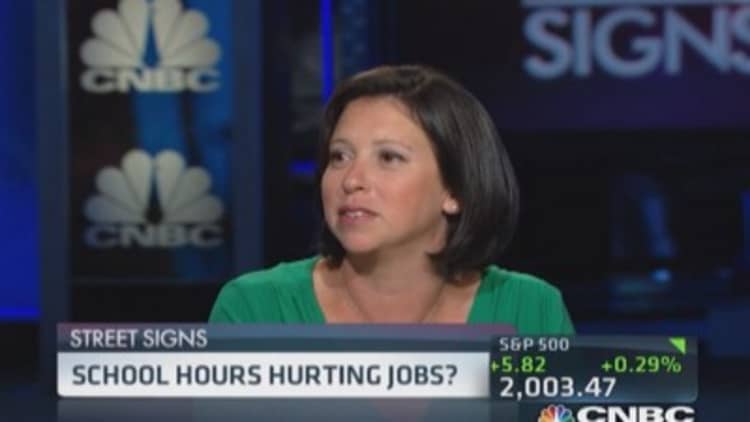Americans are leaving them on the table like never before when it comes to vacation days, essentially working for free almost one week per year, according to a new study by Oxford Economics.
U.S. workers are using only 77 percent of their paid time off, according to the research group's report released Tuesday. And the decline is not just tied to recent economic worries; use of vacation days are at their lowest point in the past four decades. In 2013, U.S. workers took an average of 16 days of vacation compared with 20.3 days in 2000, according to the report.
The study, commissioned by the U.S. Travel Association, found that American workers earned just under 21 paid-time-off days in 2013 (excluding sick days,) but used only 16. And while some employees are allowed to bank or roll over their vacation days into the next year, an average of 1.6 days were completely forfeited, according to the survey.
In total, that's about 169 million days forfeited, amounting to $52.4 billion in lost benefits.
Other studies have highlighted the other cost of all those unused vacation days to employees—and companies. According to internal research by audit firm EY (formerly Ernst & Young), employees who use more vacation days end up with better performance reviews. Taking vacations can also help slow down employee turnover, saving companies the cost and effort of recruiting and training new hires. Other research has linked vacation time to increased worker productivity.
Read MoreIs going on vacation becoming too much work?
To be sure, the U.S. Travel Association has a vested interest in promoting research to encourage people to make use of their vacation days. In February, the industry group announced an "unprecedented effort to motivate American workers to use more of the paid time off they have earned," which could funnel $160 billion in travel spending to support 1.2 million jobs.
And while the travel industry is hitting all-time highs, with about $900 billion in annual direct spending, most of the growth is from international travelers and business and meeting travel, leaving room for growth in leisure, said Roger Dow, the association's CEO and president.
But getting people to take those vacation days isn't always so easy, he said.
"I was one of those people," Dow said, admitting he had been leaving about 11 or 12 days on the table a year. "I get a decent amount of vacation, but I lost track of it. Then it gets to be December."
And when the boss doesn't take all his vacation days, that can send the wrong message, he said. His workplace now sends out emails near Memorial Day and Labor Day reminding each employee how many vacation days they have remaining for the year.
There are many reasons why Americans don't take all their vacation time, said John de Graaf, executive director of the nonprofit Take Back Your Time.
"I think a lot of people are fearful of the workload they'll come back to, and some know they'll be on call during their vacation anyway," de Graaf said. "The increasing inequality plays a major factor in the U.S. because people are feeling they have to work longer to keep pace." Other reasons include workers who don't want to be seen as the office slacker and career couples unable to schedule their vacations at the same time, he said.
The United States is one of the few countries that doesn't mandate any paid vacation days, said de Graaf, whose group is lobbying for 12 vacation days per year for Washington state workers. It would come close to the rate in Puerto Rico, he said, where workers can accrue up to three weeks of paid vacation time each year.
However, more businesses are beginning to see the benefits of vacation time, both de Graaf and Dow said.

Some companies, such as Virgin Group and Netflix, are even offering unlimited or unmonitored vacation days. "I'm seeing a trend, it's starting on the West Coast," Dow said. "It's a big movement."
Read MoreVirgin's Branson offers unlimited vacation
The Oxford Economics report was based on the Current Population Survey from the U.S. Bureau of Labor Statistics as well as a June survey of 1,303 American workers conducted by GfK Public Affairs and Corporate Communications.


